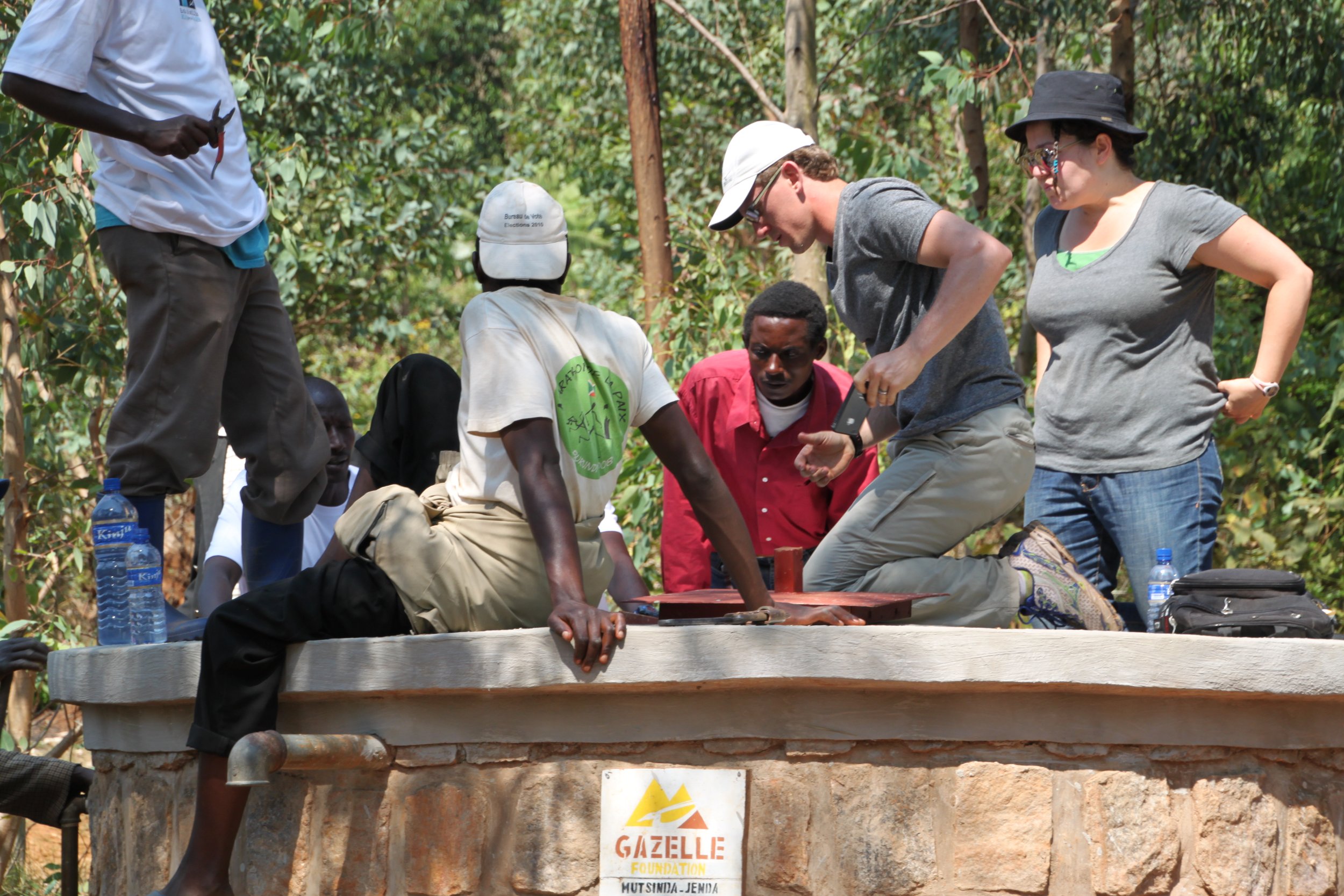Board Member, Michael Madison has traveled to Burundi eight times over the last 15 years to help the Gazelle Foundation build clean water systems. His presence in the country has established relationships that keep Foundation projects moving forward and has earned him the unofficial role as the Foundation’s Ambassador to Burundi.
Measuring the Foundation’s impact
In 2013, Madison went back to Burundi to collect on-the-ground data from beneficiaries of the water systems built by the Gazelle Foundation. At the time (and still true today) there was no available public or private collection of data regarding the impact of the water systems. The Foundation board agreed with Michael’s recommendation to spend a few days in Burundi to do some research. It was the first time the Foundation would have hard data to guide their planning and mission. Michael spent five days walking house-to-house, village-to-village measuring distances to water sources, and conducting interviews with villagers, schools and medical clinics.
From tap locations, Michael used his GPS to record distance to nearby homes. He asked about previous access to water, and found most villagers had been at least one mile away from water sources. Since the placement of Gazelle Foundation water systems, the average distance had been cut down to less than 400 meters—a huge improvement for daily life.
Other types of questions Michael asked were, “How many goats do you have?” Or, “What are you doing with your time now that you don’t have to walk so far for water?” They told him they had more time to attend to crops in the field, and some of the women had time to sew or to make little things to take to market for sale or trade.
One of the most promising findings was kids were able to get to school on time and be there all day. Gazelle Foundation water systems also serve schools which allows children a break from having to fetch water before and during the school day. Instead, it’s right there on campus. Not to mention, the clean water helps children avoid illnesses from contaminated water, so hopefully they will be in school more often.
The long-term impacts of clean, accessible water aren’t really measurable from this type of research. It will take years to fully realize the positive impact of the Foundation’s work, but it is obvious the work so far has been life-changing for the villagers.
“Every time I go, there's anecdotal stories from people about how thankful they are because they don't have to walk as far for water. And now they can do other things with that time. To be able to provide this resource and take away the burden of physically fetching water, opens the door to new possibilities,” says an optimistic Madison.
“The work that is being done is making a difference. It is changing lives.”
Oversight and ownership
The Foundation’s first water system, completed in 2008, provided some valuable lessons for navigating future projects. It’s not uncommon for a new nonprofit to experience growing pains, especially in a third-world country thousands of miles away. Corruption in the country was an issue that needed to be addressed in order to keep projects on time and within budget.
Madison notes, “The region's prior experiences with western aid organizations were completely different from our model and it took a few extra months to impress our standard operating procedures. For as much corruption there is in aid to countries in need, we remain at the top for integrity and mission-focused deliverance.
“We got better at it. And now there's a process to how we choose the location, how we get it started and how we get it to completion. Then we hand it over to the community.”
Thanks in part to Michael’s presence and oversight of the projects in Burundi, the Foundation has made an invaluable relationship with local Project Manager, Jean Bosco Ndabaniwe. Jean Bosco has been the Foundation’s only water system manager since 2009 (after project number one) and is a trusted member of the Gazelle Foundation team.
Madison feels keeping the work with local laborers is better for everyone. “We contract Bosco, and then on his own, he subcontracts others. We trust that.
“Tessa and I chose this organization because the work that is being done is making a difference. It is changing lives. And I think it's one of the most effective ways a Western nonprofit can operate in a third world country—allowing the people who are going to benefit from it do the work and have ownership of it.”
The Gazelle Foundation has now built 64 systems in the last 14-15 years, and they are all still in working order. This is not only a testament to the quality of construction, but also to the importance the local people have put into maintaining the systems. And while providing jobs is not the Foundation’s primary mission, it’s nice to see that the water systems also create jobs, income and pride within the community.
Madison mentions how readily it is to see Gazelle Foundation tanks scattered across the landscape. “it’s very noticeable,” he says. “But, there is a lot more work to do. A lot more people to serve.”
Fifteen Years of Dedication, Part 3 >>
Learn about Madison’s most recent trip, and why he wanted his family to take the trip with him.









